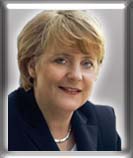Merkel cabinet approves controversial refugee museum
 Berlin - Plans for a controversial museum dealing with the ordeal of post-Second-World-War German refugees were approved Wednesday by Chancellor Angela Merkel's cabinet in Berlin.
Berlin - Plans for a controversial museum dealing with the ordeal of post-Second-World-War German refugees were approved Wednesday by Chancellor Angela Merkel's cabinet in Berlin.
Work may begin within weeks to set up the permanent exhibition in a government office block in the capital's Anhalter Bahnhof area.
Poland and the Czech Republic worried the museum would portray them as villains. Millions of ethnic Germans were expelled from eastern Europe as borders were revised after Nazi Germany's defeat. Warsaw has now granted a cautious blessing to the museum.
Descendants of the refugees campaigned for the museum, claiming that their sufferings had been blanked out of Europe's collective memory, and the Merkel government promised them a monument.
The cabinet referred legislation to parliament to set up a foundation against expulsions and for reconciliation, a Merkel aide, Bernd Neumann, said.
The foundation will manage the museum in conjunction with the German History Museum, which has its main sites elsewhere in Berlin and in Bonn. Work could start on the exhibition this autumn, Neumann added.
The next delicate step will be appointing the foundation's board of directors. Poland has made clear it would resent any appointment of the refugee groups' national leader, Erika Steinbach, to the board, whereas the refugees adamantly support her.
The exhibition is expected be mainly based on an earlier exhibition in the German History Museum in Bonn about the poverty-stricken refugees' difficult integration in post-war West Germany.
Neumann said the exhibition would focus mainly on the German experience but would also refer to the wider tragedy of 20th century ethnic purges including those conducted against other peoples by the Nazis. (dpa)